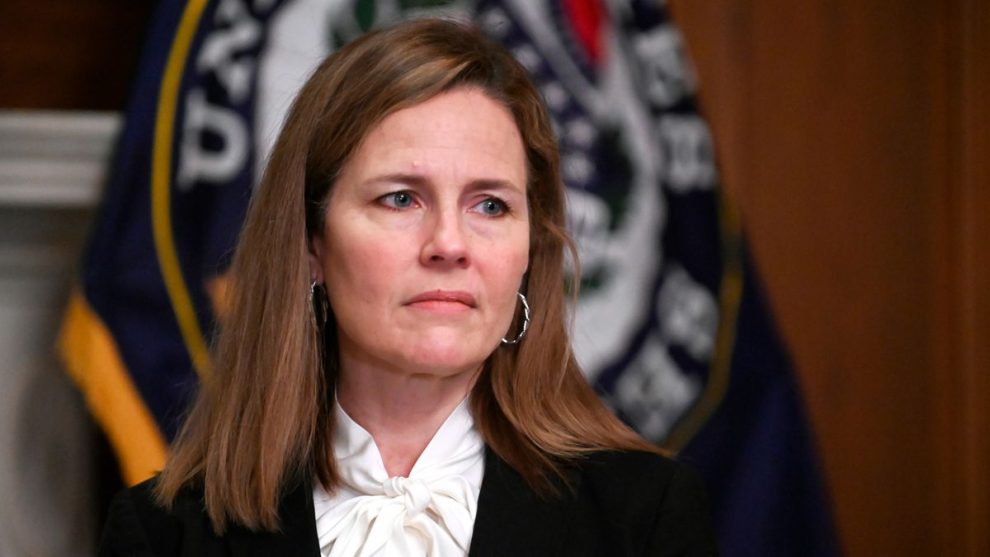Amy Coney Barrett was confirmed Monday night to the Supreme Court. With all eyes off her confirmation hearings, the focus has now shifted to which cases are going to be before the court – and which cases could come before the court – with Barrett weighing in.
In 2018, Philadelphia’s Department of Human Services launched an investigation into two foster care provider agents for potentially violating the city’s anti-discrimination laws. The agencies allegedly refused to work with same-sex couples who wanted to become foster parents.
One of the agencies was Catholic Social Services (CSS), a religious nonprofit organization. CSS confirmed it would not certify same sex couples as foster parents. As a result, the city stopped referring foster children to the agency, noting non-compliance violated non-discrimination requirements that are part of the foster care agency contracts. While one agency agreed to comply with the requirements, CSS filed a suit against the city, arguing their First Amendment rights were violated along with their rights under Pennsylvania’s Religious Freedom Protection Act.
The case is unique in that it is a case not about whether private citizens can refuse service to LGBTQ people, but whether the government can order its contractors to provide services equally to everyone.
The case raises eyebrows for some, as Barrett is Catholic. During her confirmation hearings, Barrett made clear that she fully respected “all the rights of the LGBT community” and that Obergefell, which ruled same-sex marriage is legal, “is an important precedent of the court.”
“I reject any kind of discrimination on any sort of basis,” she said.
Further, Barrett served for roughly three years on the board of private Christian schools that “effectively barred admission to children of same-sex parents and made it plain that openly gay and lesbian teachers weren’t welcome in the classroom,” according to the Associated Press (AP).
Nov. 10: California v. Texas
Perhaps the most high-profile case to hit the Supreme Court next month, California v. Texas concerns the Affordable Care Act (ACA). The ACA established requirements for individuals to have health coverage and implemented fines for those without.
In 2012 the individual mandate was upheld as constitutional by the Supreme Court in NFIB v. Sebelius after Chief Justice John Roberts interpreted the individual mandate as a tax.
20 states sued in 2018 arguing the provision was unconstitutional, and in 2019 the U.S. Court of Appeals for the 5th Circuit affirmed that the individual mandate is unconstitutional because the fine doesn’t produce revenue for the government after the 2017 Tax Cuts and Jobs Act set the shared responsibility payment at zero dollars as of Jan. 1, 2019. The 5th Circuit had also sent the case back to the lower court for additional analysis as to whether the rest of the ACA can survive, which is what the Supreme Court is set to decide.
Democrats have sounded the alarm over how Justice Barrett could rule on the ACA. Democratic California Sen. Dianne Feinstein and Democratic Vermont Sen. Patrick Leahy accused Republicans of pushing Barrett as a means to strike down the ACA as a whole.
“Judge Barrett’s writings have made it unequivocally clear that she considers the act unconstitutional,” Leahy said.
Democratic Rhode Island Sen. Sheldon Whitehouse said Barrett would strike down the law.
“This Supreme Court nominee has signaled in the judicial equivalent of all caps, that she believes the Affordable Care Act must go, and that the precedent protecting the ACA doesn’t matter,” he said.
While Barrett hasn’t explicitly said she would support repealing the ACA, she criticized Roberts’ 2012 decision in a Notre Dame journal article.
“Chief Justice Roberts pushed the Affordable Care Act beyond its plausible meaning to save the statute,” she wrote. “He construed the penalty imposed on those without health insurance as a tax, which permitted him to sustain the statue as a valid exercise of the taxing power; had he treated the payment as the statute did – as a penalty – he would have had to invalidate the statute as lying beyond Congress’s commerce power.”
Ballot Extension Case Requests
The Supreme Court deadlocked this month, declining to block a Pennsylvania rule that allows mail-in ballots to be counted up to three days after Election Day whether or not they are postmarked.
Republicans in the state are now asking the Supreme Court to formally take up the case and put it on an expedited schedule to be decided before Election Day, according to CNN.
“Because the election is imminent, these questions must be answered immediately. Absent quick action by this Court, Petitioner’s appellate rights — as well as this Court’s jurisdiction over the case — could be lost,” lawyers for the Republicans argued in the filing, per the same report.
With a full court, Barrett’s vote – regardless of which way she would vote – would decide a hotly contested issue regarding the election, and perhaps set precedent for counting ballots that can reverberate throughout the country.
Republicans in North Carolina are also asking the Supreme Court to block a nine-day extension of the counting of ballots. Republicans argue that the extension is an attempt to “rewrite” the election code and usurp the General Assembly which only allowed a three-day extension, per CNN.
Abortion
The justices will consider Friday whether to hear a case that would challenge the precedent of Roe v. Wade.
The case regards Mississippi’s 15-week abortion ban which was signed into law in 2018. A federal judge struck the law down in November 2018 and the 5th Circuit Court of Appeals upheld the ruling last year.
However, Mississippi Attorney General Lynn Fitch filed supplemental briefs Thursday that referenced the Supreme Court case involving a Louisiana regulation involving hospital admitting privileges. Fitch argued Roberts’ concurring opinion appears to walk back precedent on how courts analyze the benefits and burdens of abortion laws.
Like most of her answers during her nomination hearings, Barrett would not give a straight answer on her opinions on abortion or Roe v. Wade. However, she did note that justices can’t have agendas and “impose their will on the world.”
“You have to wait for cases and controversies, which is the language of the Constitution, to wind their way through the process,” she said.
Story cited here.
























